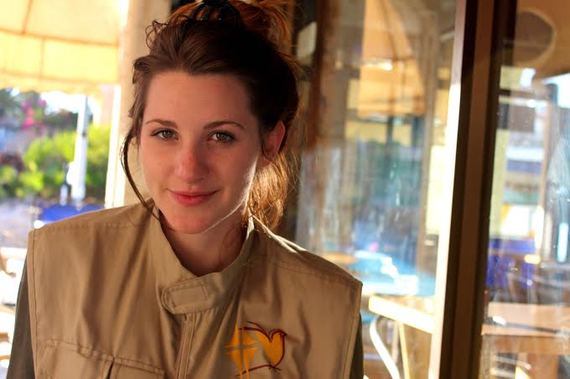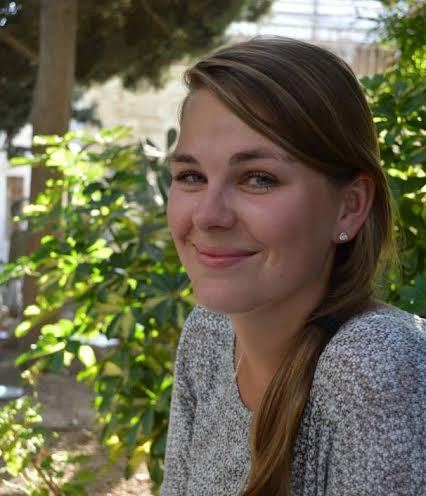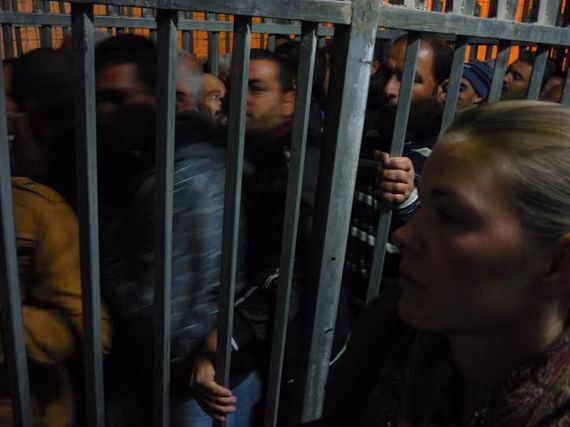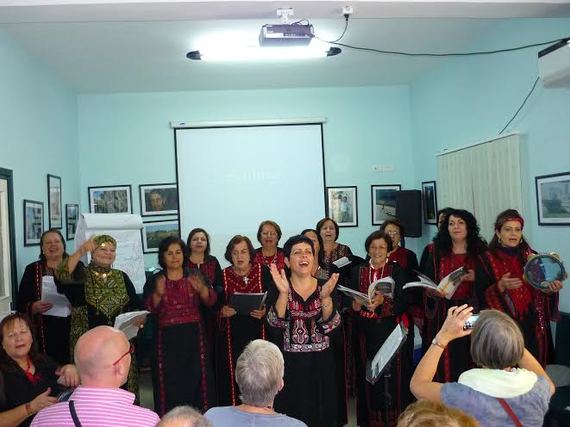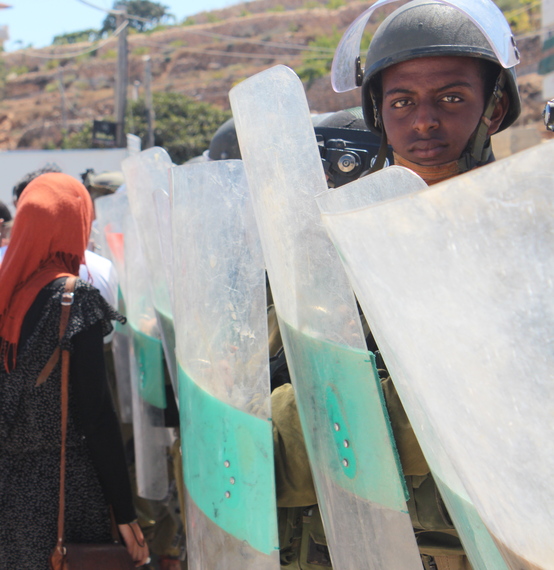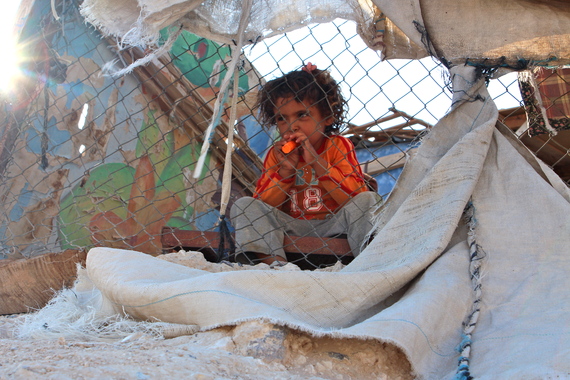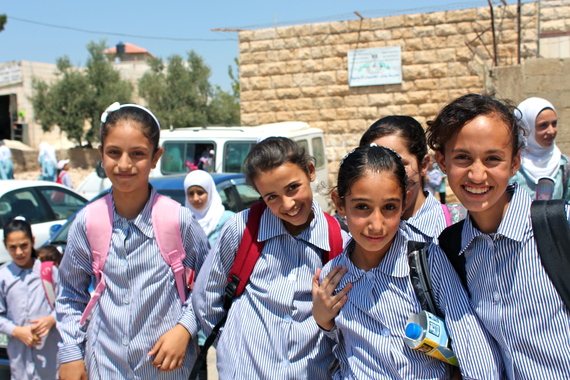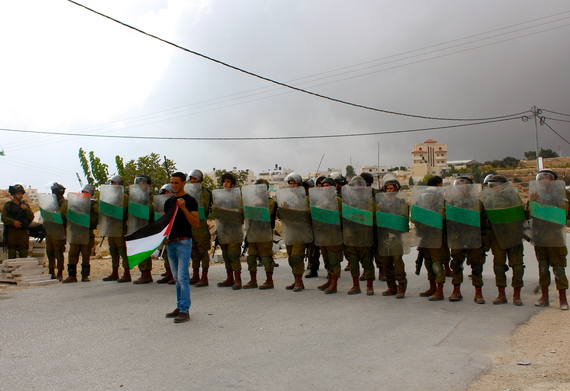Esther Kilchherr
Alexandra Rijke
In Mid-January the International Day of Solidarity With the Palestinian People was launched at the United Nations' headquarters, the idea being that intensified observance could accelerate efforts to establish peace between Israel and Palestine. "The coming year will be crucial to achieving the two-state solution," Deputy Secretary-General Jan Eliasson explained.
Eliasson said that negotiators on both sides are working hard toward a "peaceful, comprehensive settlement of all permanent status issues." He added, "It also means securing an independent, viable and sovereign state of Palestine living alongside a secure state of Israel, where each side recognizes the other's legitimate rights."
Two European women, 23-year-old Esther Kilchherr from Switzerland and 26-year-old Alexandra Rijke from the Netherlands, spent about three months in Palestine in 2013 and are sharing their experiences in an interview.
Both of them are academically trained in international relations, and Kilchherr worked as a human rights observer for the Ecumenical Accompaniment Program in Palestine and Israel (EAPPI), sent by HEKS and Peace Watch Switzerland. She was based in Bethlehem, one of the eight placements of EAPPI in the West Bank, focusing her attention primarily there, as well as in Hebron.
Rijke visited Palestine in order to implement a research project for her master's degree in international development studies. She mainly worked with the Arab Educational Institute (AEI) in Bethlehem on the concept of "sumud," meaning steadfastness and nonviolent resistance by the Palestinian people.
What motivated you to visit and work in Palestine?
EK: I have studied international relations with a major in international law, and of course the Israel-Palestine conflict has always been a subject throughout my studies. But it is completely different when you hear about it in class than when you are actually there, experience people, and realize the implications of words like "occupation" or "wall." In university you learn a lot of theories, especially in international law, but I wanted to find out how it works on the ground, and of course to experience its limits. And once you have seen the truth, you have a responsibility.
AR: I visited Palestine to implement a research project for my master's in international development studies. I have been wanting to go to Palestine for many years and felt moved by and connected to Palestinians and their situation since I was a teenager. I found it very difficult when I was younger to not only realize that such injustice was going on but that the international community is doing not enough to try to stop it. I worked on my project at the Arab Educational Institute in Bethlehem, and the subject was the concept of "sumud," steadfastness and nonviolent resistance by the Palestinian people. I focused on the Sumud Story House during my stay, where women came together and shared their stories. They were given the space to feel safe, share their feelings and experiences and feel as part of a community.
Checkpoint 300 in the early morning
What were your experiences traveling into Palestine and coming back?
EK: We were well trained for what was awaiting us concerning the culture and the conflict. But nothing can really prepare you for it. They explain to you what, for example, a checkpoint is, but only when you stand in front of it you start to really understand what "checkpoint" means. To see all the implications of the conflict -- the wall, the soldiers, how the Palestinians get treated -- to hear testimonies from the people, and so on, was a huge shock. On the other hand, it was also quite scary how quickly you get used to all of it. And there are also positive sides; it's not just conflict, military and misery. For example, we had to provide protective presence during olive harvest because Palestinians and/or their trees get sometimes attacked by Israeli settlers during that time, so we accompanied and helped them. It's always a big event; the whole community is out in the fields and helping each other. It was one of the most peaceful, touching and fun experiences I have had in my life.
AR: Arriving at Ben Gurion, I was asked some questions about my stay and received the visa after half an hour. It was unpleasant; they were not particularly nice, but I guess that is the intention. However, when comparing this to what my boyfriend had to go through, it was absolutely nothing. When he came to visit me for two weeks, they kept him at the airport for eight hours before they gave him the visa. His parents are Tunisian, and although he was born and raised in the Netherlands and traveled with his Dutch passport, he was clearly treated very differently than I. Going back was, for both of us, a lot easier. Our luggage was checked, we were both asked some questions concerning our whereabouts and my boyfriend was patted down. That was all.
What would a day of work look like?
EK: We did not have a "routine." Every day looked a bit different. Four times a week two of us were at Checkpoint 300, the crossing point of the south of the West Bank into Jerusalem. It's one of the biggest checkpoints in the occupied Palestinian territory. We would start at 4 a.m. in the morning till the queue of Palestinians going into Jerusalem was clear, usually at around 7 a.m. We would monitor how many people were able to go through, intervene if there were problems, particularly when the Humanitarian Lane wasn't open (a lane for privileged access, people who have to go to the hospital, students, men and women over 65, and tourists), and provided protective presence in order to establish a smooth flow and prevent arbitrary actions from soldiers. A big part is obviously reporting everything to the concerning organizations and also back home, because part of our work is doing advocacy in our home countries. We hope that when people start realizing what is going on in Israel/Palestine, there will be pressure on national governments to put pressure on the Israeli government, and this will have as consequence that Israel will start abiding international law and human rights.
AR: I did not have a fixed schedule. I went to the Sumud Story House of the Arab Educational Institute three days a week to meet with the women's groups. After that I either had interviews, worked at home on my research or went to places such as the villages around Bethlehem and Jerusalem. Some days I joined Esther on her job, worked in a coffee shop on my laptop, or talked to people. During my interviews I asked the women of the Sumud Story House to share their experiences with me concerning the wall and their stories that are shown in the Wall Museum, a project of the AEI. These stories were at times very sad, and the women [were] clearly moved and often very emotional. I found this difficult because I'd like to better their situation, and became very aware of my enormously privileged situation as a Dutch white woman. While some parts of talking to the women in the groups of the Sumud Story House were difficult, very often it was a very positive experience at the same time. On multiple occasions they really showed hope and love for their country and their future, but also forgiveness and a willingness to build bridges and not walls. Dancing, laughing and singing were important parts of their lives.
Women at the Sumud Story House
How were your interactions with both Israelis and Palestinians?
EK: I had good and bad interactions with both sides. Usually the Palestinians were very nice and grateful for my presence. With Israeli soldiers it was a bit more difficult. Sometimes they were quite nice. More often they would ignore and not talk to me, and sometimes they would get aggressive. It's truly like Anthony Bourdain said to CNN after his visit to Israel, the West Bank and Gaza: "It's easily the most contentious piece of real estate in the world, and there's no hope -- none -- of ever talking about it without pissing somebody, if not everybody, off." So talking about it with people was always a bit difficult, especially with Israelis, since they react emotionally and quickly aggressive to any criticism from internationals. I always thought twice about saying what exactly I am doing here to not end up in a heated discussion. For me this was quite strange. I am not pro-Palestine [or] pro-Israel, but I am pro-human rights, and I think no one should feel uncomfortable to stand up for those universal values. On the other hand I also had good encounters with Israelis who were open to what I had to say, who also were against settlements and the occupation, etc. Sadly, those interactions were not the majority.
AR: One encounter I experienced with Palestinians is the following: When my boyfriend came to visit me, we got stuck in Abu Dis, a town next to Jerusalem, on our way to Bethlehem. The roads were closed by the Israeli army, and no buses were going to Bethlehem anymore. All cars that went to Bethlehem took hitchhikers in their cars. We got a lift from a young guy. He did not even check who got in the car. We got in together with an older man and a woman. He just asked where we wanted to go in Bethlehem and did not take any money, although my boyfriend repeatedly tried to give it to him. Honestly, I did not have that much interaction with Israelis. I had some interaction with the soldiers at the checkpoint, which were unfortunately mostly negative.
What appear to be currently the biggest problems between the two groups?
EK: I think that one of the biggest obstacles is the mistrust from both sides. Israelis and Palestinians have deep-rooted trust issues and fear of each other. More obvious is the other big problem, which is also more current and ongoing: the separations barrier. Like the name says, it separates the two people. The wall reduces any interaction to a minimum or makes it impossible at all. As a consequence, rumors and mass manipulation through media and/or extreme opinions have much more power. Israelis are not allowed to go to the West Bank, and only few Palestinians possess the permit to go to Israel. In absence of interaction, the formation of opinion depends only on what you hear from other people of your side or see in media. And if the only thing you know about your neighbor is that one of them shot one of your people, then there is absolutely no chance of understanding each other, building trust and empathy, which is the basis of any peace agreement.
Did you get the impression that the majority on both sides would like to establish peace?
EK: After my experience I can say that the majority of the Palestinians definitely want a peaceful situation. They've had enough. They just want to live their lives and not be bothered with politics and war anymore. This conflict, with all its implication of the wall, checkpoint, permits etc., is wearing them down. Concerning the Israeli society, I think there are a lot of people that are tired of the conflict too. There are people who are questioning the conflict, the military, etc. I don't think that anyone would say that he or she doesn't want a peaceful situation. The matter of the fact is, though, that most of the Israelis don't feel the implications of the conflict as badly as Palestinians do. They are extremely scared of terror acts and in general of Palestinians. It's pretty tiring to be afraid all the time, and I am sure they want peace. But the impression they get is that this conflict, the military, checkpoints, etc., are securing their lives, and so they already have some sort of peace. In their view the wall and so on is protecting them, and as long as they are scared for their lives, they might not want to change the status quo.
AR: On the Palestinian side, yes. The occupation they are living under impacts their lives in many significant ways. They are not free to move around, to go abroad, to have a functioning economy and to build a healthy political system. They have to live with the fear that there might be a night raid, they could get arrested, their family members could get arrested and that their land could be taken from them by the wall or settlers. I would also say that the majority of the Israelis wants peace, although this is an assumption. Honestly, I did not have that many interactions with Israelis. However, I always try to assume the best of people, and I do not believe that the majority of the Israelis are happy with the current situation, although they are not as affected by it as the Palestinians are.
What were your biggest everyday fears/obstacles?
EK: I think every time I went to work, be it checkpoint, schools or villages, I was always a bit nervous of what was awaiting me. You can have a really aggressive soldier at the checkpoint, or a peaceful demonstration can escalate, etc. I have never been scared for my life, but I have been for the life of Palestinians. At checkpoint in the morning, for example, it was sometimes so crowded that I was afraid that people could be crushed to death or that during clashes someone could get hit by a teargas canister, a rubber bullet or live ammunition. I also didn't like much to confront soldiers and border police, because you have to be very careful finding the balance between standing your ground and doing your job and not provoking them too much. Personally I think the feeling of frustration was the biggest challenge, seeing all the injustice and being unable to prevent most of it.
AR: I felt very safe in Bethlehem most of the time. Everyday fears are not so much the issue once you get used to the wall, watchtowers, and bangs from clashes. However, on a deeper and much more subtle level, you feel stress from the occupation, closed checkpoints, clashes, tear gas, and soldiers. There is a lot of tension and pain in the society, many traumatized people who are hurting because of fear, imprisoned or killed love ones, and uncertainty of what the future will bring. The situation has only deteriorated since 1948, and it is unclear what will happen next.
Would you like to return to Palestine?
EK: I would absolutely like to return to Palestine. I am currently applying for an internship at the Swiss embassy in Ramallah and Tel Aviv, and hopefully I can go back this year. I think it's a wonderful country with nice people, good food, extraordinary landscapes and an interesting culture. When I left in December, I definitely left a part of my heart there.
AR: Yes! We said you either love it or hate it, and I thoroughly, with all my being, loved, loved, loved it. The country, the scenery, the people, the language, hope, laughter, smells, love, but also the feeling that what I do might actually matter to others, and maybe I could do something that positively influences other people in this lifetime.
Photos by Esther Kilchherr and Alexandra Rijke

